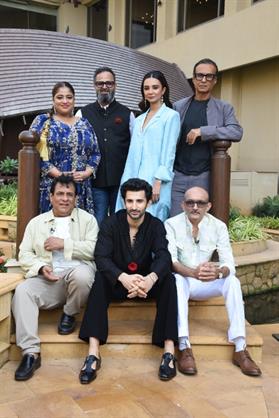
Freedom at Midnight: crams ample history with depth, dollops of drama and delicate performances
“War kill Humans, Riots kill Humanity”, Mahatma Gandhi’s lines on the dire consequences of outrage and violence that preceded the fraternal fracas between the Hindus and Muslims and eventually the darkest chapter of Indian history – the Partition is profoundly observed in Nikkhil Advani’s Freedom at Midnight, the seven-episode web series adapted from the controversial novel sharing the eponymous title and re-imagining the tumultuous socio-political fabric of our nation.
In Freedom at Might, there is a perpetual debate between our Congress leaders grappled with an extraordinary scenario – the dichotomy of power and partition, and examining the tenets of Right, Equality and Freedom. On one side, there are Gandhiji (Chirag Vohra), Pandit Jawaharlal Nehru (Sidhant Gupta), Maulana Abul Kalam Azaad (Pawan Chopra) and Sardar Vallabh Bhai Patel (Rajendra Chawla) and on the other side, there is the egotist leader of the Muslim League, MA Jinnah (Arif Zakaria) who craves to be admired and prayed and demands for a separate nation.
Chronicling the times when the decision was taken in Britain to appoint Lord Mountbatten as India’s Viceroy to the Transfer of the power plan before Independence, the narrative stays fluid offering an intimate exposition of perspectives of the leaders who steered the country’s destiny and dilemmas of the millions of its people.
Freedom at Midnight is as much an exploration of the dense political manoeuvring as it serves a nuanced portrayal of the trauma and sorrows of carnage, owing to the sentiments of partition. In the thick of the drama, the team of writers – Abhinandan Gupta, Gundeep Kaur, Adwitiya Kareng Das and Divy Nidhi Sharma flesh out not mere cardboard cuts of the Brit officials but fascinating characterizations of Lord Mount Batten and his wife Edwina, impeccably played by Luke Mcgibney and Cordelia Bugeja.
It brings out an effective recreation of the bygone era with immaculate set design, costumes and meticulous cinematography by Malay Prakash. Advani wisely eschews melodrama and graphic representations of the violence. The riot scenario is shot in monochromatic, so that the blood and gore play out superficially and don’t get under your skin. The product is voraciously researched, thorough placements of the historical montages of images and videos add credibility, and the background score adds impetus to the narration.
Crammed with ample history, facts and frenzy, and seven flabby episodes, it hosts an array of wonderful performances. “Main Gandhi ke Barabar hoon!”, Jinnah commands vociferously puffing a cigar, fretting and fuming with anguish. The differential treatment of being a minority provoked the stern and stubborn leader to leave the congress and choose the people who would follow him. The seminal scars of the religious divide continues to cause the seething pain in even today’s times. It is an ideology that stands antagonized in the narrative and exhibited solidly by the talented Zakaria. But for a discerning critic, a flawed and fascinating figure who toppled the fate of our country in his pursuit of power and fame needed a more complex thesis and footage. Jinnah’s sisters Fathima, played by Ira Dubey, also leaves so much to be desired.
Chirag Vohra’s physical transformation to a frail Bapu, perennially dismayed at the turn of events, is remarkable. The ‘Scam 1992’ actor masterfully embraces the pulse and poignance of the Father of the nation. Striking a balance between morals and machinations, Rajendra Chawla’s Sardar Patel is a sterling thesis in itself – I have not seen Ketan Desai’s Sardar with Paresh Rawal playing the leader’s part, but this is one character who deserves a spin-off in the OTT dossier. The weakest link in the entire chapter is probably Sidhant Gupta, representing the flamboyance and melancholy of Panditji in misguided proportions and prosthetics. He is one of the crucial characters who didn’t deserve to be squandered with one-note sullen expressions. The grief was intact, but the gumption was missing. K C Shankar as VP Menon and Maliska Mendonsa as Sarojini Naidu render credible performances.